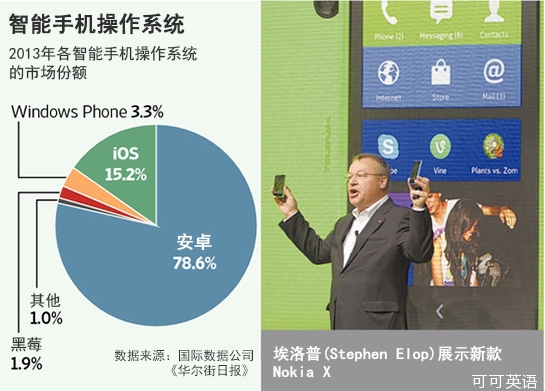
It is telling that one of the devices garnering much attention at this week's Mobile World Congress is a phone that will start at an unsubsidized price of about $122.
在本周的全球移动通讯大会(Mobile World Congress)上,一款非合约版起价只有122美元的手机引起了大家的关注。
Even more telling: the device is from Nokia, using the Android operating system that is owned by Google, rival to Nokia's soon-to-be parent Microsoft. Another twist is that smartphone buyers in established markets such as North America may never see it. The Nokia X is targeted at regions including India, Latin America, Africa and the Middle East where consumers have limited funds for wireless gizmos.
更重要的是,这款手机是诺基亚公司(Nokia Co.)推出的,采用谷歌(Google Inc.)安卓(Android)系统,谷歌是微软(Microsoft Co.)的竞争对手,而微软即将成为诺基亚东家。还有一个出人意料之处,这款名为Nokia X的手机不投放北美等成熟市场,而是面向印度、拉美、非洲和中东等手机购买力较弱的市场发售。
Microsoft may feel a bit unsettled by the move, but it is illustrative of the limited options available to companies in the smartphone business whose names aren't Apple, Google or Samsung. The Android and iOS platforms accounted for nearly 96% of all smartphones shipped last year, according to IDC. Samsung and Apple together accounted for more than 46% of global shipments by vendor, with everyone else getting single-digit market shares.
微软或许会稍感不安,不过这说明了在智能手机市场,除了苹果(Apple Inc.)、谷歌或三星(Samsung Electronics Co.)以外的公司选择有限。国际数据公司(International Data Corporation, 简称IDC)表示,去年安卓和iOS智能手机的发货量占有率几乎达到96%。三星和苹果占全球智能手机制造商发货量的46%以上,所有其他品牌的市场份额均不到10%。
This is why many observers write off other companies as also-rans. But it is important to realize that smartphones are unlike the PC market that Microsoft has dominated with Windows.
这也是为什么许多观察人士将其他手机公司一概归入失败者的行列。不过需要指出的是,智能手机市场与微软Windows占主导地位的PC市场是有差别的。
Compared to PCs, smartphones have a shorter replacement cycle and are often not locked down by employers, which often allow staff to choose their own devices. So customers aren't permanent; they can shift to new devices and platforms.
相比个人电脑,智能手机的更换周期更短,而且一般老板不会要求雇员必须使用哪种手机,而是允许员工自行选择手机。因此手机用户不是永久不变的,他们随时可能换一部新手机或是改用别的操作系统。
In this light, a bet like the one being placed by Microsoft and Nokia isn't a surefire loser. Microsoft will try to sell Nokia X buyers on its own software and services, with hopes of converting them to a Windows Phone down the road. The dynamics of the smartphone market are also why new entrants including Lenovo and Asus still smell opportunity despite their late start.
这样看来,微软和诺基亚的这步棋并非注定失败。微软会努力向购买Nokia X手机的用户推荐自己的软件和服务,寄希望于有朝一日这些用户会改用Windows Phone。智能手机市场的这种特性也说明了像联想集团有限公司(Lenovo Group Ltd., 简称:联想集团)和华硕(Asus)这种后来者为什么仍然能嗅到机会。
But it remains a stretch. The easy money is gone, and profits will be harder to come by. IDC forecasts the smartphone market to grow at 18.4% per year to 2017, after averaging 46.5% over the last three years. Handset average selling prices, meanwhile, are expected to hit about $265 by 2017--down 21% from 2013, IDC predicts. Apple and Samsung still claim most of the available profits given their ability to squeeze large price subsidies from wireless carriers.
不过后来者要挑战行业巨头也绝非易事。智能手机的暴利时代结束了,赚钱变得越来越困难。IDC预测,智能手机市场的年增长率到2017年将降至18.4%,过去三年的平均增长率为46.5%。IDC还预计,手机平均售价到2017年将跌至265美元左右,较2013年下跌21%。苹果和三星仍将占据大部分利润,因为它们的议价能力更强,能够从无线运营商那里争取到较多的价格补贴。
New entrants will need to prove their devices can sell volumes big enough to maintain support from carriers and retailers. More of those sales will be made on price rather than features--and there is no app that makes that easy.
后来者必须证明自己的手机能够大卖,否则难免会失去运营商和零售商的支持。对这些手机生产商来说,产品能不能畅销更多地取决于价格而不是性能,这绝不是容易做到的事。


